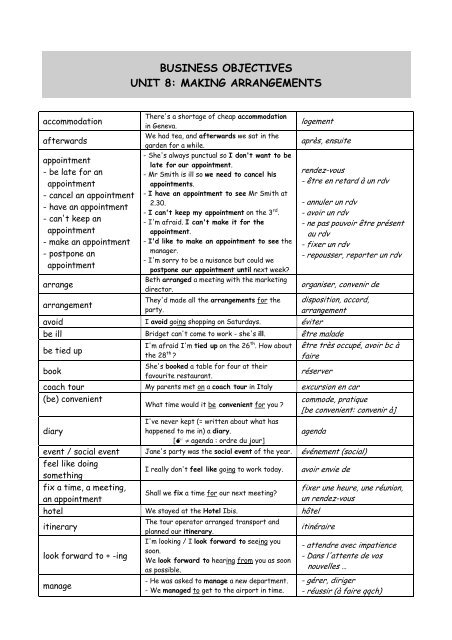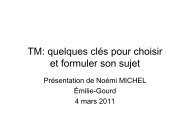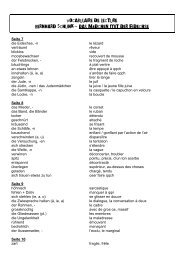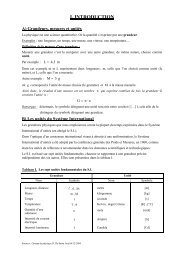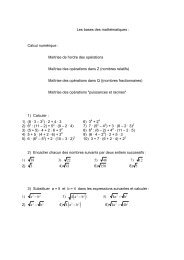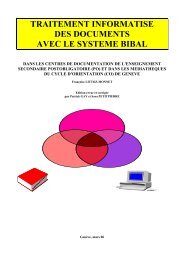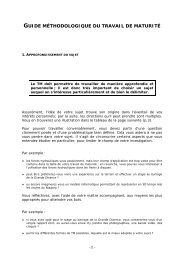Business Objectives - Vocabulary - Units 1-10
Business Objectives - Vocabulary - Units 1-10
Business Objectives - Vocabulary - Units 1-10
You also want an ePaper? Increase the reach of your titles
YUMPU automatically turns print PDFs into web optimized ePapers that Google loves.
BUSINESS OBJECTIVES<br />
UNIT 8: MAKING ARRANGEMENTS<br />
accommodation<br />
afterwards<br />
appointment<br />
- be late for an<br />
appointment<br />
- cancel an appointment<br />
- have an appointment<br />
- can't keep an<br />
appointment<br />
- make an appointment<br />
- postpone an<br />
appointment<br />
arrange<br />
arrangement<br />
There's a shortage of cheap accommodation<br />
in Geneva.<br />
We had tea, and afterwards we sat in the<br />
garden for a while.<br />
- She's always punctual so I don't want to be<br />
late for our appointment.<br />
- Mr Smith is ill so we need to cancel his<br />
appointments.<br />
- I have an appointment to see Mr Smith at<br />
2.30.<br />
- I can't keep my appointment on the 3 rd .<br />
- I'm afraid. I can't make it for the<br />
appointment.<br />
- I'd like to make an appointment to see the<br />
manager.<br />
- I'm sorry to be a nuisance but could we<br />
postpone our appointment until next week?<br />
Beth arranged a meeting with the marketing<br />
director.<br />
They'd made all the arrangements for the<br />
party.<br />
logement<br />
après, ensuite<br />
rendez-vous<br />
- être en retard à un rdv<br />
- annuler un rdv<br />
- avoir un rdv<br />
- ne pas pouvoir être présent<br />
au rdv<br />
- fixer un rdv<br />
- repousser, reporter un rdv<br />
organiser, convenir de<br />
disposition, accord,<br />
arrangement<br />
avoid I avoid going shopping on Saturdays. éviter<br />
be ill Bridget can't come to work - she's ill. être malade<br />
be tied up<br />
book<br />
I'm afraid I'm tied up on the 26 th . How about<br />
the 28 th ?<br />
She's booked a table for four at their<br />
favourite restaurant.<br />
être très occupé, avoir bc à<br />
faire<br />
réserver<br />
coach tour My parents met on a coach tour in Italy excursion en car<br />
(be) convenient<br />
commode, pratique<br />
What time would it be convenient for you ?<br />
[be convenient: convenir à]<br />
diary<br />
I've never kept (= written about what has<br />
happened to me in) a diary.<br />
agenda<br />
[ ≠ agenda : ordre du jour]<br />
event / social event Jane's party was the social event of the year. événement (social)<br />
feel like doing<br />
something<br />
fix a time, a meeting,<br />
an appointment<br />
I really don't feel like going to work today.<br />
Shall we fix a time for our next meeting?<br />
hotel We stayed at the Hotel Ibis. hôtel<br />
itinerary<br />
look forward to + -ing<br />
manage<br />
The tour operator arranged transport and<br />
planned our itinerary.<br />
I'm looking / I look forward to seeing you<br />
soon.<br />
We look forward to hearing from you as soon<br />
as possible.<br />
- He was asked to manage a new department.<br />
- We managed to get to the airport in time.<br />
avoir envie de<br />
fixer une heure, une réunion,<br />
un rendez-vous<br />
itinéraire<br />
- attendre avec impatience<br />
- Dans l'attente de vos<br />
nouvelles …<br />
- gérer, diriger<br />
- réussir (à faire qqch)
(be a) nuisance<br />
I hate to be a nuisance, but could you help<br />
me ?<br />
open Sarah had recently opened an office in Genoa. ouvrir<br />
patron<br />
Will patrons [ = customers] kindly note that<br />
this pub will be closed on 12th July ?<br />
be a nuisance: déranger,<br />
importuner qqun<br />
client, client régulier d'un<br />
restaurant, bar, bistrot…<br />
pick up I'll pick you up at the station. aller chercher quelqu’un<br />
plan What are your plans for this weekend ? projet<br />
Regards<br />
Kind regards<br />
Best regards<br />
schedule (v + n)<br />
see<br />
Hope to see you soon. Regards,<br />
Chris<br />
The meeting has been scheduled for<br />
tomorrow afternoon.<br />
How can he fit everything into his busy<br />
schedule ?<br />
See you on Thursday at ten, then.<br />
See you ! : Salut. A plus !<br />
Salutations à la fin d'un Fax<br />
ou d'un e-mail<br />
- établir le programme<br />
- programme, planning<br />
show Figures show a 9% rise in inflation. montrer, indiquer<br />
shuttle<br />
There's a shuttle service from the city<br />
centre to the airport.<br />
navette<br />
sound<br />
He sounded very depressed when we spoke on<br />
the telephone yesterday.<br />
avoir l'air, sembler<br />
spell How do you spell "Beckham" ? épeler<br />
suit<br />
- How about two o'clock outside the cinema ?<br />
- That suits me fine.<br />
convenir à, aller à<br />
tourist spot Disneyworld is a very popular tourist spot. lieu touristique<br />
voir<br />
EXPRESSIONS<br />
Are you free … / How about next<br />
Wednesday ?<br />
Fine, thank you for calling.<br />
Hello, nice to hear from you.<br />
I can make / manage Friday.<br />
I'm afraid I can't come / make it to<br />
Tuesday's meeting.<br />
I'm afraid I can't make it.<br />
I'm afraid I'm busy / tied up.<br />
That would be nice.<br />
That's a good idea.<br />
That's fine.<br />
We need to arrange / to find a time for a<br />
meeting.<br />
What day / What time would suit you /<br />
would be convenient ?<br />
Etes-vous libre … ? / Que diriez-vous de mercredi<br />
prochain ?<br />
Merci d'avoir appelé.<br />
Bonjour, content d'avoir de vos nouvelles.<br />
Je peux m'arranger pour vendredi. / Vendredi me<br />
va, me convient.<br />
Désolé, je ne pourrai pas venir à la réunion de<br />
mardi.<br />
Désolé, je n'y arriverai pas.<br />
Désolé, je suis occupé.<br />
Ca serait bien / sympa.<br />
C'est une bonne idée.<br />
C'est bien.<br />
On doit trouver un moment pour une réunion.<br />
- Quel jour vous conviendrait-il ?<br />
- A quelle heure cela vous conviendrait-il ?
Inviting… Saying YES! Saying NO!<br />
- Would you like to … ?<br />
- Do you feel like … -ing ?<br />
- How about … -ing ?<br />
- Thank you. I'd love / like<br />
that.<br />
- That would be lovely.<br />
- That's a good idea.<br />
- Yeah, great!<br />
- I'd love to but …<br />
- I'm sorry, but …<br />
- Well, actually …<br />
- I'm afraid …<br />
Fixing a time… Saying YES! Saying NO!<br />
- Can you make 2 o'clock on<br />
Thursday ?<br />
- Can you manage 9am<br />
tomorrow ?<br />
- How about <strong>10</strong>.15 ?<br />
- Are you free on the 26 th at<br />
3.30 ?<br />
- Yes, that suits me.<br />
- Yes, I'm free.<br />
- Yes, that's fine.<br />
- I'm afraid I can't make it.<br />
- I'm afraid I can't manage<br />
it.<br />
- I'm afraid I'm tied up.<br />
Dates British English American English<br />
Writing the dates:<br />
Saying the dates:<br />
What's the problem when you<br />
see: 6/<strong>10</strong>/06?<br />
15/04/06<br />
15 th April 2006<br />
the fifteenth of April two<br />
thousand and six<br />
Notice that in English we<br />
say the and of when<br />
giving dates, but we do not<br />
use the and of when we<br />
write them.<br />
04/15/06<br />
April 15 th 2006<br />
We say both April the<br />
fifteenth and April fifteenth.<br />
Use only the British<br />
system!<br />
In England we refer to 6th October, whereas in America we refer<br />
to June <strong>10</strong>th.<br />
Cultural note: There has been a trial for compensation for late<br />
delivery on a cargo shipment and though they didn’t win it, it was<br />
advised to use the British system internationally or write the date<br />
in full !
Expressions<br />
Hello. My name is ….<br />
Hi !<br />
Good morning.<br />
Good afternoon.<br />
Good evening.<br />
How do you do ? Answer: How do you do! ?<br />
I didn’t understand what you said.<br />
Could you repeat, please ?<br />
I don't think we've met.<br />
I work for …. I’m an apprentice.<br />
I’m responsible for budgeting.<br />
Bonjour. Je m’appelle ….<br />
Salut !<br />
Bonjour !<br />
Bonjour ! (après-midi)<br />
Bonsoir.<br />
Enchanté ! Très heureux (de faire votre<br />
connaissance) !<br />
Je n’ai pas compris ce que vous avez dit.<br />
Pourriez-vous répéter, SVP ?<br />
Je ne crois pas que nous nous soyons rencontrés.<br />
Je travaille pour… . Je suis apprenti(e)<br />
Je suis responsable du budget.<br />
Just for fun ! Juste pour s'amuser !<br />
May I introduce you to Peter Brown ? Puis-je vous présenter à Peter Brown ?<br />
Nice to meet you.<br />
Pleased to meet you.<br />
Ravi de vous rencontrer.<br />
Peter, this is Mike Smith of Hewlett Packard. Peter, voici Mike Smith de HP.<br />
Toss a coin ! Faites pile ou face !<br />
What line of business are you in ? Dans quel domaine êtes-vous ?<br />
What do you do for a living ? Que faites-vous dans la vie ?<br />
I'd like to …<br />
J'aimerais<br />
Question words<br />
How far is it ?<br />
How long does it take you to get to work ?<br />
What nationality are you ?<br />
When do you start work in the morning ?<br />
What time do you have lunch ?<br />
Where are you from ?<br />
Where do you work ?<br />
Why are you studying English ?<br />
Why don't you come along ?<br />
Only 500 meters.<br />
About 15 minutes.<br />
I'm Swiss.<br />
At 8 o'clock !<br />
At noon.<br />
I'm from Italy.<br />
In Meyrin.<br />
I need it for my job.<br />
Because I'm too busy.<br />
Adverbs of frequency<br />
always We always attend his meetings. toujours<br />
never We never listen to music in class. jamais<br />
often She often writes letters. souvent<br />
rarely They rarely deal with customers. rarement<br />
sometimes Do you sometimes travel abroad? parfois<br />
usually He is usually on time. habituellement


